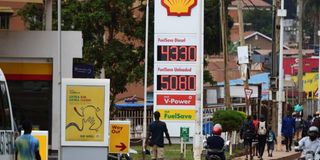Prime
Don’t take Ugandans’ resilience for granted

A fuel price display board at Shell fuel station in Kibuli, Kampala, on February 17, 2022. PHOTO / ABUBAKER LUBOWA
What you need to know:
- The issue: Fuel prices
- Our view: So proactive thinking and flexibility might be required to avert a possible shock and stop taking for granted the so-called resilience by citizens and businesses.
What was feared has come to pass. Russia attacked Ukraine and regardless of if the conflict becomes bigger than it already is.
Global oil prices hovered around $100 per barrel having shot to $105 a barrel on Thursday last week. That price increment from average $90 per barrel of oil to where it is now may be seen in the local pump price subsequently. So the cost per litre locally of Shs5,050 may then head towards Shs5,100 or more.
It seems as though the consumers are on their own as the economic managers for Uganda are eagerly pointing elsewhere for what is happening after the passing of the January border crisis that caused the first pump price hikes.
Top government economists warn that while the weight of fuel as an item in the inflation basket is low because few households use fuel directly, the effect it is starting to have on cost of more consumed household commodities like soap and food is a downside risk to the otherwise more optimistic approach the economy had started to have. It is not very clear yet if the oil price phenomenon can gravitate into an economic shock but it is not yet entirely ruled out.
Can monetary policy stem the effect of the oil prices on the economy? The answer is no. What the management of money locally can do is limit its circulation and velocity to reduce the buying power of citizens so as to force down prices. The complexity with the current situation is that any higher prices of commodities will not result from poor supply but the incidence of imported inflation. So again the citizen will remain hard-pressed.
That leaves the fiscal side. There might be a high degree of reluctance to act by government using fiscal means praying that the problems of rising prices goes away but if it doesn’t action might be necessary. For instance what has Kenya done? The government has maintained a fuel subsidy for diesel to make sure prices remained manageable because of the potential to cause inflation for other basic commodities like it has already started happening in Uganda
What fiscal options exist for Uganda; a time bound tax adjustment, say for diesel like in Kenya, if direct price subsidization is not feasible.
The risk of letting prices of commodities run away due to imported inflation at a time when the economy is only starting to recover can mean using monetary policy that will see lending rates rise again, which is precisely the wrong thing to happen at this material time. So proactive thinking and flexibility might be required to avert a possible shock and stop taking for granted the so-called resilience by citizens and businesses.
READ MORE: Who does the govt work for?




